Unit 14 Clauses
Unit14 Adjective Clauses & Paradoxes
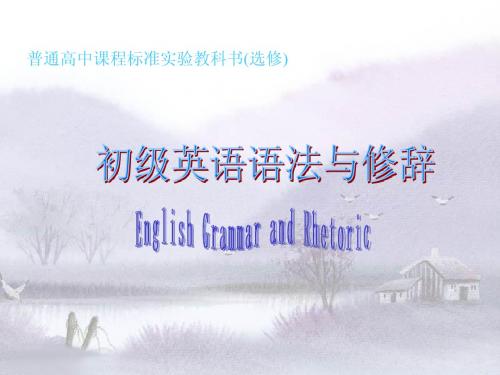
leader Famous speech “I Have A Dream”
Looking Ahead
Learn to use different relative words to introduce adjective clauses.
Practice using restrictive and non-restrictive adjective clauses.
Hero
And then a hero comes along With the strength to carry on And you cast your fears aside And you know you can survive So when you feel like hope is gone Look inside you and be strong And you'll finally see the truth That a hero lies in you
Jack Jim First Second Third
Speak
Dance Play dead
The noun, pronoun or clause that the adjective clause modifies is called an antecedent. Eg. antecedent
I lost the pen. Jim sent me that yesterday.
e a relative word instead of the noun.
I lost the pen that Jim sent me yesterday.
3.Move it to the beginning to introduce the clause, unless it is already there.
九年级英语unit14知识点梳理

九年级英语unit14知识点梳理Unit 14: Knowledge ReviewIntroduction:In the ninth grade, students dive deeper into their English language learning journey. Unit 14 serves as a stepping stone in their language proficiency and comprehension. This knowledge review aims to consolidate the key concepts and skills covered in this unit, providing a comprehensive overview for students to better understand and retain the information.Vocabulary:1. Synonyms and Antonyms:Unit 14 introduces a plethora of vocabulary words. To enhance word knowledge, it is crucial to identify synonyms and antonyms. Synonyms are words that have similar meanings, while antonyms are words with opposite meanings. By recognizing these relationships, students can expand their vocabulary and improve their written and spoken language skills.2. Compound Words:Compound words are formed by combining two or more separate words. Unit 14 familiarizes students with various compound word examples, such as "sunshine," "raincoat," and "football." Understanding and utilizing compound words can significantly enrich students' language understanding and enable them to express themselves more effectively.Grammar:1. Passive Voice:The passive voice is an important grammatical structure covered in Unit 14. In passive voice sentences, the subject receives the action, instead of performing it. For example, "The concert was attended by thousands of fans." Understanding when and how to use passive voice constructions is crucial to effective communication, especially in formal writing.2. Reported Speech:Reported speech, also known as indirect speech, is another essential grammatical skill introduced in Unit 14. It involves reporting or retelling what someone else said, using appropriate verb tense and pronoun changes. For instance, "She said that she was tired." By mastering reported speech, students can accurately convey information and maintain good dialogue structure in both written and spoken English.Reading:1. Comprehension Strategies:Unit 14 focuses on honing students' reading abilities. Employing comprehension strategies is vital to grasp the main ideas, identify supporting details, and understand the overall context. Effective strategies include skimming, scanning, and making connections between new information and prior knowledge. These techniques strengthen critical thinking skills and boost reading comprehension.2. Contextual Clues:Interpreting unfamiliar words is a common occurrence during reading. Unit 14 encourages students to develop their contextual clue skills. Contextual clues consist of surrounding words, phrases, and sentences that provide hints about the meaning of unknown words. By utilizing this strategy, students can improve their vocabulary acquisition and overall reading comprehension.Writing:1. Paragraph Organization:Unit 14 emphasizes the importance of coherent paragraph organization. A well-structured paragraph consists of a topic sentence –introducing the main idea, supporting sentences - providing relevant details, and a concluding sentence - summarizing the paragraph. By mastering paragraph organization, students can enhance their written communication skills, convey their ideas effectively, and strengthen the logical flow of their writing.2. Descriptive Writing:Descriptive writing plays a crucial role in Unit 14. Students are encouraged to use vivid adjectives, sensory details, and figurative language to create a clear and engaging description. By practicing descriptive writing, students can not only improve their language skills but also evoke emotions and capture the attention of their readers.Conclusion:Unit 14 serves as a crucial milestone in a ninth grader's English language journey. By reviewing the key vocabulary, grammar, reading, and writing concepts covered in this unit, students can solidify their knowledge and enhance their language abilities. Continuous practice and application of these skills will undoubtedly lead to further growth and proficiency in English.。
(精编)Unit14理解要点诠释单词
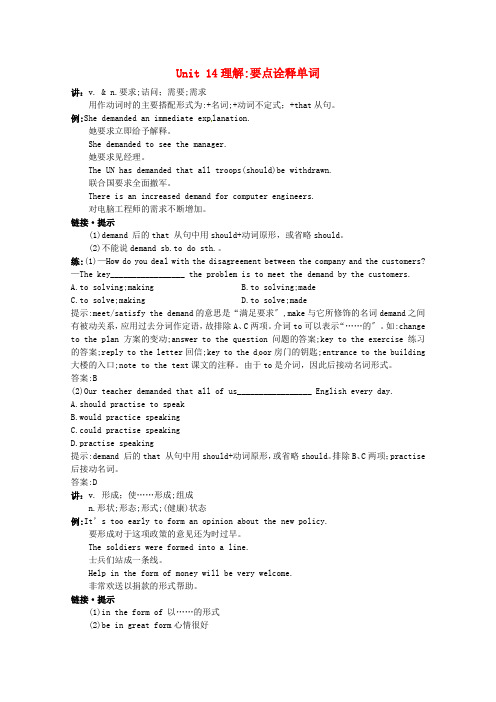
Unit 14理解:要点诠释单词讲:v. & n.要求;诘问;需要;需求用作动词时的主要搭配形式为:+名词;+动词不定式;+that从句。
例:She demanded an immediate exp lanation.她要求立即给予解释。
She demanded to see the manager.她要求见经理。
The UN has demanded that all troops(should)be withdrawn.联合国要求全面撤军。
There is an increased demand for computer engineers.对电脑工程师的需求不断增加。
链接·提示(1)demand 后的that 从句中用should+动词原形,或省略should。
(2)不能说demand sb.to do sth.。
练:(1)—How do you deal with the disagreement between the company and the customers? —The key_________________ the problem is to meet the demand by the customers. A.to solving;making B.to solving;madeC.to solve;makingD.to solve;made提示:meet/satisfy the demand的意思是“满足要求〞,make与它所修饰的名词demand之间有被动关系,应用过去分词作定语,故排除A、C两项。
介词to可以表示“……的〞。
如:change to the plan 方案的变动;answer to the question问题的答案;key to the exercise练习的答案;reply to the letter回信;key to the d oor房门的钥匙;entrance to the building 大楼的入口;note to the text课文的注释。
高一英语 下学期unit14
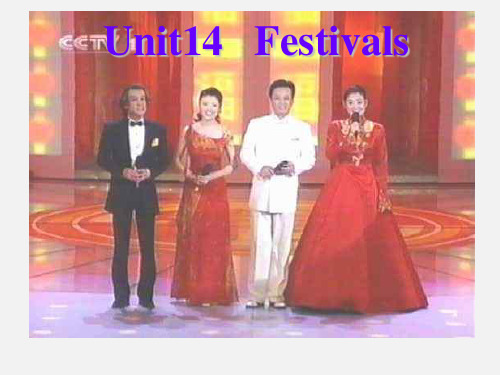
3 and March 9, always __4_7_ days before Easter Sunday.
During Mardi Gras, people like to __d__r_e_s_s_ up in colourful and __c_o_s_t_u_m__e_scostumes, and of course, __w_a__tc_h__ parades in the streets. The official _c_o_l_o_r_sof Mardi Gras are purple, green and _g_o_ld_. Mardi Gras is celebrated for __tw__o__ weeks before Fat Tuesday and
ninth month of Arabic lunar calendar
fast/not eat or smoke/Koran daylight/stay up/sing/dance/eat
Why to do
religious reason
Where to do
Africa/ the Middle East
What (not) to do Eat/ egg hunts/bunnies
Why to do
religious reason
Where to do
western countries
Who celebrates it Christians
How old
For centuries
PEACE DAY
countries/ region/ continents/ union
九年级英语unit14单词知识点

九年级英语unit14单词知识点Unit 14 is an important unit in the 9th grade English curriculum. It covers a wide range of vocabulary words that are essential for students to build a solid foundation in English. In this article, I will discuss some key points about the vocabulary words in Unit 14.1. Adjectives related to food:In Unit 14, students learn adjectives that describe different types of food. For example, "delicious" means the food tastes good, while "spicy" means it has a strong, hot flavor. Other adjectives include "sour," "salty," "bitter," and "sweet." By understanding these adjectives, students can effectively express their preferences and opinions about different types of food.2. Phrases for describing quantities:Another important aspect of Unit 14 is learning how to describe quantities. Students are introduced to phrases such as "a can of," "a bottle of," "a loaf of," and "a carton of." These phrases help students describe the amount or packaging of different items. For example, "acan of soda" or "a carton of milk." Mastering these phrases enables students to be more specific and accurate in their descriptions.3. Vocabulary related to cooking:Unit 14 also introduces vocabulary related to cooking. Students learn words such as "boil," "stir," "chop," "slice," and "grill." Understanding these cooking terms allows students to follow recipes and instructions more effectively. It also enhances their ability to describe cooking processes or techniques in English.4. Comparatives and superlatives:Comparatives and superlatives are important grammar structures covered in Unit 14. Students learn how to form comparative and superlative adjectives to compare different items or qualities. For example, they learn to change "big" to "bigger" and "the biggest." By mastering these structures, students can express comparisons more accurately and concisely.5. Vocabulary related to health:Unit 14 also includes vocabulary words related to health. Students learn words such as "allergy," "symptom," "cough," "sneeze," and "fatigue." Understanding these words helps students talk about health issues and symptoms they may experience. It also enables them to communicate effectively with medical professionals in English.6. Verbs related to daily activities:In Unit 14, students are introduced to verbs that describe daily activities. Some examples include "brush," "wash," "comb," "shower," and "dress." By learning these verbs, students can effectively explain their daily routines and habits.In conclusion, Unit 14 is a comprehensive unit that covers various vocabulary words and grammar structures. By mastering the vocabulary and grammar points discussed above, students can enhance their language skills and effectively communicate in English. It is important for students to regularly practice using these words and structures in order to reinforce their understanding and fluency.。
英语九年级14课知识点

英语九年级14课知识点Unit 14: Choosing a CareerIn ninth grade English, students learn about various aspects of choosing a career. This unit aims to familiarize students with important vocabulary, concepts, and skills related to career planning. The following are the key points covered in this unit:1. Exploring Different Careers:One of the first steps in choosing a career is to explore various options available. Students learn how to research and gather information about different careers. They are encouraged to consider their interests, skills, and values when exploring potential career paths.2. Vocational Skills:This section focuses on the importance of developing vocational skills. Students learn about the specialized skills required for different professions such as communication, problem-solving, teamwork, and adaptability. They understand that developing these skills can enhance their employability in the future.3. Higher Education and Training:The unit also emphasizes the significance of higher education and training in career development. Students are introduced to different types of educational institutions, such as universities, community colleges, and vocational schools. They learn about the benefits of pursuing further education or vocational training to gain relevant qualifications for their desired careers.4. Resume Writing:Students are introduced to the basics of resume writing. They learn how to create a well-structured resume that highlights their qualifications, skills, and experiences. They also understand the importance of tailoring their resumes to suit the specific requirements of different job opportunities.5. Interview Skills:This section focuses on developing effective interview skills. Students learn about the different types of interviews, common interview questions, and appropriate responses. They practice strategies for presenting themselves professionally, demonstrating confidence, and effectively conveying their suitability for the desired position.6. Career Research Project:To further enhance their understanding of the career exploration process, students undertake a career research project. They choose a career of interest and conduct in-depth research to gather information about job responsibilities, educational requirements, salary expectations, and potential career growth opportunities.7. Setting Goals:Setting career goals is an essential aspect of career planning. Students learn how to set SMART (Specific, Measurable, Achievable, Relevant, Time-bound) goals that align with their long-term career aspirations. They understand the significance of goal-setting in maintaining focus and motivation throughout their career journey.8. Ethical Considerations:This unit also highlights the importance of ethical considerations in career decision-making. Students explore ethical dilemmas that professionals might face and learn how to analyze and make ethical choices in their future careers.Overall, Unit 14 provides ninth-grade students with a comprehensive overview of the knowledge and skills needed for careerplanning. By the end of this unit, students will have a deeper understanding of different career options, the importance of vocational skills and education, and the necessary steps to embark on a successful career path.。
Unit14单词变形讲义高中英语牛津译林版(2020)选择性
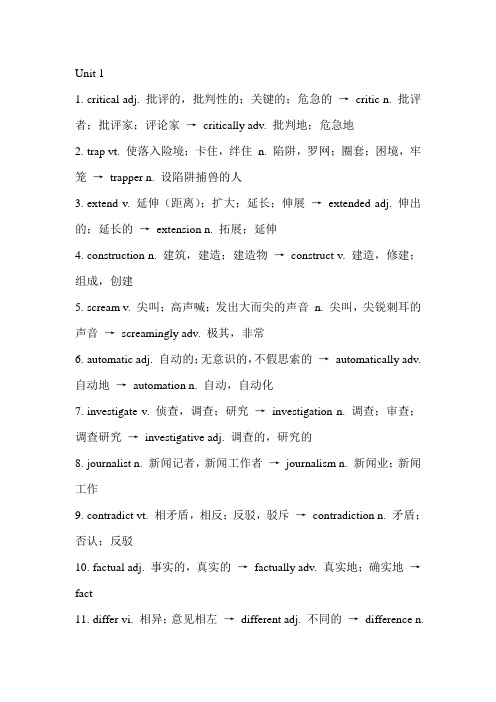
Unit 11.critical adj. 批评的,批判性的;关键的;危急的→critic n. 批评者;批评家;评论家→critically adv. 批判地;危急地2.trap vt. 使落入险境;卡住,绊住n. 陷阱,罗网;圈套;困境,牢笼→trapper n. 设陷阱捕兽的人3.extend v. 延伸(距离);扩大;延长;伸展→extended adj. 伸出的;延长的→extension n. 拓展;延伸4.construction n. 建筑,建造;建造物→construct v. 建造,修建;组成,创建5.scream v. 尖叫;高声喊;发出大而尖的声音n. 尖叫,尖锐刺耳的声音→screamingly adv. 极其,非常6.automatic adj. 自动的;无意识的,不假思索的→automatically adv. 自动地→automation n. 自动,自动化7.investigate v. 侦查,调查;研究→investigation n. 调查;审查;调查研究→investigative adj. 调查的,研究的8.journalist n. 新闻记者,新闻工作者→journalism n. 新闻业;新闻工作9.contradict vt. 相矛盾,相反;反驳,驳斥→contradiction n. 矛盾;否认;反驳10.factual adj. 事实的,真实的→factually adv. 真实地;确实地→fact11.differ vi. 相异;意见相左→different adj. 不同的→difference n.差异,不同12.conclusion n. 结论,推论;结束,结果;签订,达成→conclude v. 推断;决定,作结论;结束13.minimum n. 最小值,最少量adj. 最低的,最小的→minimal adj. 最小(少,低)的14.accurate adj. 正确无误的;精确的→accurately adv. 正确地;准确地;精确地→accuracy n. 正确;准确;精确mit vt. 承诺,保证;犯(罪);花(钱或时间)vi. 全心全意投入;忠于→commitment n. 献身,投入;承诺,许诺;花费→committed adj. 尽心尽力的16.discrimination n. 辨别力,识别力;歧视,区别对待→discriminate v. 区别,辨别;歧视,区别对待anize vt. 处理,安排;组织,筹备;规划,管理→organized adj. 有组织的→organization n. 组织18.curiosity n. 好奇心,求知欲;奇物,珍品→curious adj. 好奇的19.tax n. 税,税款vt. 对……征税,使纳税→taxable adj. 可征税的;应征税的→taxpayer n. 纳税人20.profession n. 行业,职业;同行;宣称,声明→professional adj. 专业的,职业的;职业性的n. 专业人员;职业运动员21.interaction n. 互动;互相作用→interact v. 相互影响/作用22.broadcast n. 广播节目,电视节目v. 播送,广播;散步,传播→broadcasting n. 广播23.advertising n. 广告活动,广告业→advertisement n. 广告,启事;广告活动,广告宣传→advertise v. 做广告,登广告;公布,征聘;展现,宣传24.persuasion n. 说服,劝说;信仰→persuade vt. 说服;使信服25.purchase vt. 买,购买n. 购买,采购;购买的东西,购买项目→purchaser n. 购买(物)者26.memorable adj. 难忘的,值得纪念的→memorably adv. 难忘地;明确地;显著地27.rating n. 收视率;等级,级别→rate n. 比率,率;速度;价格;等级vt. 看好;评价;值得28.absorb vt. 理解,掌握;吸收;吸引全部注意力→absorbed adj. 全神贯注的→absorbing adj. 吸引人的29.amuse vt. (提供)消遣;逗笑→amusement n. 欢愉;娱乐,消遣;娱乐活动→amusing adj. 逗人笑的;有乐趣的→amused adj. 逗乐的,觉得好笑的1.participate vi. 参加,参与→participant n. 参加者,参与者→participation n. 参加,参与pete vi. 参加比赛;竞争→competitor n. 参赛者;竞争者→competition n. 比赛;竞争→competitive adj. 竞争的;有竞争力的3.racial adj. 种族的;种族间的→racially adv. 种族地4.diverse adj. 多种多样的,不同的→diversity n. 多样性;差异5.motivate vt. 激励,激发;成为……的动机,是……的原因→motivation n. 动力;动机→motivated adj. 积极的,主动的6.demonstrate vt. 表现,表露;证实,证明;示范,演示vi. 游行示威→demonstration n. 表现;证明;演示7.applaud v. 称赞,赞许;鼓掌→applause n. 鼓掌,喝彩8.consistent9.election n. 选举,推选;当选→elect v. 选举,推选;选择10.faith n. 信心;宗教信仰→faithful adj. 忠诚的,忠实的11.ambition n. 追求的目标,夙愿;野心,雄心,壮志→ambitious adj. 有抱负的,有野心的12.identical adj. 完全同样的→identify vt. 识别;确认;发现→identity n. 身份;特性13.gradually adv. 逐渐地,逐步地→gradual adj. 逐渐的,逐步的14.limit n. 限度,限制;限量,限额;界限vt. 限制,限定;限量,减量→limited adj. 有限的→limitless adj. 无限的→limitation n.15.grace n. 高雅,文雅;优美;风度,体面→graceful adj. 优雅的;有风度的→disgrace n. 丢脸,耻辱16.unselfish adj. 无私的,忘我的→unselfishly adv. 无私地→unselfishness n. 无私17.opposing adj. 对抗的;相反的→oppose vt. 反对→opposed adj. 反对的plain v. 抱怨,投诉→complaint n. 抱怨,投诉19.unintentionally adv. 无意地,非故意地→intentional adj. 有意的,故意的→intention n. 计划,意图→intend v. 打算;计划;想要;意指20.cruel adj. 刻毒伤人的;残酷的→cruelty n. 残忍,残酷,残暴21.literally adv. 真正地,确实地;按字面,字面上→literal adj. 字面意思的1.specialize vi. 专门研究(或从事),专攻→special adj. 特别的;专用的→specially adv. 特别地;专门地2.affect vt. 影响;侵袭,使感染;深深打动→effect n. 影响3.contract vt. 感染(疾病);与……订立合同(或契约);vi. 收缩n. 合同,合约→contraction n. 收缩,缩小4.identify vt. 找到,发现;确认,认出;显示,说明身份→identity n. 个性,特性;身份5.means n. 方法,方式;财富,钱财→mean v. 意思是;意味着;打算;意欲adj. 吝啬的;刻薄的;平均的;中间的→meaning n. 意思;含义;意义;重要性→meaningful adj. 意味深长的6.apply v. 申请;应用→application n. 申请;应用7.ultimately adv. 最终;根本上→ultimate adj. (目标等)最终的8.abnormal adj. 反常的,畸形的→normal adj. 正常的,平常的n. 常态;通常标准;一般水平→normally adv. 正常地;通常9.fundamental adj. 十分重大的,根本的;基础的,基本的n. 基本规律,根本法则,基础→fundamentally adv. 根本地,从根本上;基础地10.restrict vt. 限制,限定;束缚,妨碍;约束;管束→restriction n. 限制;约束;束缚11.prohibit vt. (尤指以法令)禁止;使不可能→prohibition n. 禁止;禁令12.resistance n. 抵抗力;抵制,反对;抵抗,反抗→resist v. 抵抗,抗拒;忍耐→resistant adj. 抵抗的,反抗的,抗拒的13.characteristic adj. 典型的,独特的n. 特征,特点→character n. 性格,品质;特性;角色;字符;文字14.wrestle v. 奋力对付,努力处理;摔跤→wrestling n. 摔跤;扭斗→wrestler n. 摔跤选手,搏斗者15.finding n. 调查发现,调研结果→find vt. 查找,找到;发现16.ripe adj. 成熟的;时机成熟的→ripeness n. 成熟;老练17.equip vt. 配备;使有能力→equipment n. 设备,装备;器材18.capable adj. 有能力的;有才干的→incapable adj. 不能的;无能力的;不能胜任的19.disabled adj. 有残疾的,丧失能力的→disability n. 缺陷,障碍20.conventional adj. 传统的,习惯的;依照惯例的,遵循习俗的→convention n. 大会;惯例21.sensory adj. 感觉的,感官的→sense n. 感觉,意识vt. 感觉到,意识到22.distance n. 距离;远方→distant adj. 遥远的;冷漠的23.disturb vt. 使不安;打扰;搅乱→disturbed adj. 烦恼的→disturbing adj. 引起烦恼的;令人不安的24.adjust v. 调整,调节;适应,习惯;整理→adjustment n. 调整;调节→adjustable adj. 可调整的,可调节的25.evidence n. 证据,证明;物证,人证vt. 证明,表明→evident adj.明显的,显然的→evidently adv. 显然地,明显地;据说26.solid adj. 实心的;固体的;结实的;纯色的→solidly adv. 坚固地;结实地27.examine vt. 检查,检验;审查,调查;考,测试;审问→examination n. 考试;检查28.severe adj. 十分严重的,极为恶劣的;严厉的;艰难的→severely adv. 很严重地;极为恶劣地29.anxiety n. 焦虑;担心;渴望→anxious adj. 焦虑的,担心的;渴望的→anxiously adv. 焦虑地;急切地30.symbol n. 象征;符号,代号→symbolic adj. 象征的,象征性的31.infection n. 传染,感染→infect v. 传染;使感染→infectious adj. 传染的32.department n. (医院的)科,部门,局,系→departmental adj. 部门的Unit 41.analyse vt. 分析→analytic adj. 分析的,解析的→analysis n. 分析2.massive adj. 巨大的,大而重的;非常严重的→mass n. 块,团;大量,许多;质量→massed adj. 大批的3.finance n. 财政,金融;资金;财力,财务管理vt. 提供资金→financial adj. 财务的;财政的→financially adv. 经济上地;财务地4.threaten vt. 危及,对……构成威胁;威胁,恐吓→threat n. 构成威胁的人(或事物);威胁,恐吓;凶兆→threatening adj. 威胁的;恐吓的5.urge vt. 敦促,催促;大力推荐,竭力主张;驱赶,鞭策n. 冲动,强烈的欲望→urgent adj. 紧急的,紧迫的,迫切的→urgency n. 紧急,紧迫,迫切6.apparently adv. 显然,可见→apparent adj. 显而易见的;明白的7.warning n. 警告,先兆;警戒→warn v. 警告;提醒;告诫8.demand vt. 需要;强烈要求n. 要求,所需之物;需求,需要→demanding adj. 要求高的;苛求的9.recognition n. 识别,认出;承认,认可;赞誉,赏识→recognize vt. 认出,识别;承认;接受,认可;赞赏10.alternative n. 可供选择的事物adj. 可供替代的;非传统的→alternatively adv. 两者选一地→alternation n. 交替(轮流)11.distribution n. 分发,分送;分配,分布→distribute vt. 分配;分布;分销12.predict vt. 预言,预言,预报→predictable adj. 可预见的,可预料的→prediction n. 预言,预测,预告13.conclude v. 断定,推断出;达成,订立;(使)结束,终止→conclusive adj. 结论性的;不容置疑的;确凿的→conclusion n. 结论;结局;推论14.justified adj. 合乎情理的,事出有因的;有正当理由的→justify v. 证明合法;整理版面;证明……是正当的;替……辩护15.definition n. 定义;释义,解释→definite adj. 肯定的;确定的→define vt. 给……下定义16.practical adj. 实际的,真实的;切实可行的;有用的;实事求是的→impractical adj. 不切实际的,不现实的→practicable adj. 可行的;行得通的→practice n.&v. 实践;练习17.academic adj. 教学的,学术的;学习良好的;纯理论的→academically adv. 学术上;学业上18.initial adj. 最初的,开始的n. 首字母→initially adv. 起初,首先19.annoy vt. 使恼怒,使生气;打扰,骚扰→annoyance n. 生气;恼怒;令人生气(烦恼)的事物→annoying adj. 令人生气(烦恼)的→annoyed adj. 恼怒的;生气的20.expense n. 费用;开销;开支→expensive adj. 昂贵的,费钱的21.envy n. &vt. 羡慕,忌妒→envious adj. 忌妒的。
《新托福专项进阶-初级写作》【WORD版】

智课网TOEFL备考资料《新托福专项进阶-初级写作》【WORD版】摘要:你是刚刚备考托福写作么?是不是对托福写作不是很了解?很多问题困扰着你,别怕!今天小编向你推荐一本《新托福专项进阶-初级写作》,这本书就是专门为刚刚备考的你准备的,我们一起来看看精彩内容。
今天小编为大家推荐一本叫《新托福专项进阶-初级写作》,这本书专门为刚刚备考托福写作的人准备的,各位考生如果你刚刚备考那么久一起来看看吧。
《新托福考试专项进阶:初级写作》是《新托福考试专项进阶》系列丛书之一,从托福考试所考查的听、说、读、写四项技能入手,为考生提供了详尽的考试指导,并将各技能分为初、中、高三级,通过独特的“进阶训练”方式,再辅以大量练习,让考生逐步掌握托福实考的技巧,同时切实提高英语实际运用能力,从而在短期内轻松取得托福高分。
本丛书内容编排由易到难,循序渐进,实战性强,是不可多得的托福备考资料。
本丛书引进自韩国多乐园出版社。
该社成立于1977年,在韩国英语教育出版领域始终处于领军地位。
本丛书被韩国众多学校和培训机构指定为课堂教材,在托福考生中享有较高声誉。
《新托福专项进阶-初级写作》目录ContentsIntroductionHow to Use This BookPART 1 Essential Grammar for WritingUnit 1 Basic Sentence Structure / Gerunds / InfinitivesUnit 2 Participles / VoiceUnit 3 Parallelism / ComparisonUnit 4 Noun Clauses / Adjective ClausesUnit 5 Adverb Clauses / ConditionalsPART 2 Essential TOEFL CollocationsUnit 6 School & EducationUnit 7 Family & SocietyUnit 8 Economy & BusinessUnit 9 Living & ThinkingUnit 10 Culture & LeisureUnit 11 Health & EnvironmentUnit 12 Science & TechnologyPART 3 Essential Patterns & ExpressionsUnit 13 Agree / Disagree IUnit 14 Agree / Disagree IIUnit 15 Preference IUnit 16 Preference II以上就是小编为大家准备的《新托福专项进阶-初级写作》的部分内容,各位考生这是一本非常不错的用书,非常值得拥有哦,点击下载按钮获取本书全部内容。
新概念第二册unit14..
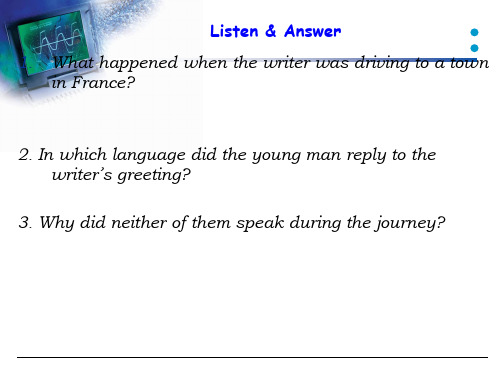
Key Words and Expressions
amusing a. 有趣的
experience
wave
n. 经验,体验
v. 挥手
ask sb. for a lift
apart from reply language journey reach
要求搭车
除…以外 n. 回答 n. 语言 n. 旅行 v. 到达
amusement n.娱乐,消遣。[U]
【New words and expressions】
★amusing adj. 好笑的, 有趣的 funny adj. 好笑的(不一定要笑出声可以 指贬义),开心的,令人开心的 interesting / funny story
2.Experience
Listen & Answer 1. What happened when the writer was driving to a town in France?
A young man waved to the writer and
2. In which language did the young man reply to the writer’s greeting?
Language 1)语言 speak a language,讲一门语言 a foreign language, the second language native language 母语 The native language is Chinese. mother tongue 母语(口语中用) My mother tongue is Chinese. 2)除了文字以外的传达,人造语言 body language,sign language
高一英语第十四单元

高一英语第十四单元科目英语年级高一章节第十四单元关键词高一英语第十四单元文件 high1 unit14.doc标题内容基础知识导引1盚ave you considered using the lab in your free class?你有没有考虑过在自由活动的课上利用这个实验室呢?consider νi.&νt.“考虑”,“认为”,“体谅”句型:νt.a.~(单独使用)b.~+prep.phrase(接介词短语)νt.a.~+n./pron./ν.\|ing/ωh\|ωord+to\|inf./clause(可以接“名词”、“代词”、“动名词”、“疑问词+不定式”、“从句”作宾语,不接“不定式”作宾语)b薄+复合宾语(接宾语+宾语补足语)e.g.He always considered carefully before he acted.他总是三思而后行。
We must consider well over the matter.我们必须好好考虑这个问题。
Mary never coniders others.玛丽从不为别人着想/从不体谅别人。
Jane considered marrying peter.简考虑过和彼得结婚。
Jane you considered where to spend your holiday?你已经考虑过去什么地方度假了吗?I consider him(to be)honest./I consider nim(to be)an honest man./I consider that he is an honest man.我认为他是老实人。
We are eonsidering whether to do the tomato experiment(=whether we should do the tomato experiment).我们正在考虑是否应该做这项西红柿实验。
新概念青少版2a_unit14_chocolate_heaven教学文稿40页PPT

文稿
6、法律的基础有两个,而且只有两个……公平和实用。——伯克 7、有两种和平的暴力,那就是法律和礼节。——歌德
8、法律就是秩序,有好的法律才有好的秩序。——亚里士多德 9、上帝把法律和公平凑合在一起,可是人类却把它拆开。——查·科尔顿 10、一切法律都是无用的,因为好人用不着它们,而坏人又不会因为它们而变得规矩起来。——德谟耶克斯
ห้องสมุดไป่ตู้
1、最灵繁的人也看不见自己的背脊。——非洲 2、最困难的事情就是认识自己。——希腊 3、有勇气承担命运这才是英雄好汉。——黑塞 4、与肝胆人共事,无字句处读书。——周恩来 5、阅读使人充实,会谈使人敏捷,写作使人精确。——培根
unit14知识点总结

unit14知识点总结Unit 14 mainly covers the following topics: Environment and Pollution, Conservation and Protection, and the impact of human activities on the environment. In this unit, students will learn about the different types of pollution, their causes, and their impacts on the environment and human health. They will also learn about the importance of conserving natural resources and protecting the environment for future generations.Environment and Pollution1. Types of PollutionThere are several types of pollution, including air pollution, water pollution, and soil pollution. Air pollution is caused by the emission of harmful gases and particles into the atmosphere, which can lead to respiratory problems and other health issues. Water pollution occurs when toxic substances, chemicals, or waste products are released into water bodies, affecting aquatic life and human health. Soil pollution is caused by the deposition of toxic chemicals and waste products in the soil, leading to reduced soil fertility and contamination of crops.2. Causes of PollutionThe main causes of pollution are human activities, such as industrial processes, transportation, and the use of fossil fuels. These activities release harmful gases and chemicals into the environment, leading to the deterioration of air, water, and soil quality. Deforestation, mining, and improper waste disposal also contribute to environmental pollution.3. Impacts of PollutionPollution has a wide range of negative impacts on the environment and human health. It can lead to respiratory diseases, cardiovascular problems, and other health issues. It also harms wildlife and ecosystems, affecting biodiversity and ecological balance. Pollution can also lead to the degradation of natural resources and environmental degradation, which threatens the sustainability of future generations.Conservation and Protection1. Conservation of Natural ResourcesConservation is the sustainable use and management of natural resources to ensure their availability for future generations. It involves protecting ecosystems, wildlife, and biodiversity, as well as reducing the consumption of resources and minimizing waste. Conservation efforts aim to maintain the balance of nature and the ecological integrity of natural systems.2. Protection of the EnvironmentThe protection of the environment involves implementing policies and measures to prevent pollution, improve air and water quality, and preserve natural habitats. It also includes the regulation of industrial activities, the enforcement of environmental laws, and the promotion of sustainable practices. Environmental protection is essential for safeguarding human health and the well-being of the planet.The Impact of Human Activities on the Environment1. DeforestationDeforestation is the clearing of forests for agricultural, urban, or industrial purposes, which leads to the loss of biodiversity, soil erosion, and habitat destruction. It also contributes to climate change, as forests play a crucial role in regulating the carbon cycle and maintaining the balance of greenhouse gases in the atmosphere.2. Climate ChangeClimate change is the long-term alteration of temperature and typical weather patterns in a place. It is primarily caused by the release of greenhouse gases, such as carbon dioxide and methane, into the atmosphere, which leads to global warming and other climate-related impacts, such as extreme weather events, sea-level rise, and the melting of polar ice caps.3. OverfishingOverfishing is the excessive harvesting of fish and other marine species, leading to the depletion of fisheries and the disruption of marine ecosystems. It threatens the sustainability of marine resources and the livelihoods of fishing communities, as well as the food security of millions of people who depend on seafood as a primary source of protein. In conclusion, Unit 14 provides students with a comprehensive understanding of environmental issues, pollution, conservation, and the impact of human activities on the environment. It aims to raise awareness about the importance of protecting the environment, conserving natural resources, and adopting sustainable practices to ensure the well-being of future generations and the planet. By studying these topics, students can develop a sense of responsibility and become advocates for environmental stewardship and sustainable development.。
高一英语下学期Unit14

1. On the eve of Spring Festival houses are brightly lit and a large family is served. Most people celebrating the festival stay up till midnight. And the fireworks are lit usually to drive away evil spirits. And the first day of the festival is always spent visiting neighbors , families and friends. 2. Because the coming of the Spring Festival announces the coming back of life. The festival is also celebrated to welcome the coming of Spring.
Nature Day 自然节
Example: STUDENT A: I think that the new holiday should be a Peace Day. On this day, no fighting or conflicts are allowed .People will learn and talk about peace. The holiday will be celebrated on and people will celebrate it by . I think this is the best idea because .
get together 聚会 greet the new year迎接新年 have many things in common有很多相同地方 do as much as sb. can to do sth尽力去做某事 the week following Christmas Day 圣诞节后的那个星期 take in sb. 欺骗某人 greet sb. 向某人打招呼 It is one’s turn to do sth 轮到某人做某事 common sense 常识 (固定搭配) remind sb. to do sth 提醒某人做某事 gather up 收集起来 take in 吸收,包括,领会take on 雇佣 in memory of 为了纪念look into调查
九年英语全册UNIT14IREMEMBERMEETINGALLOFYOUINGRADE复习课件人教新
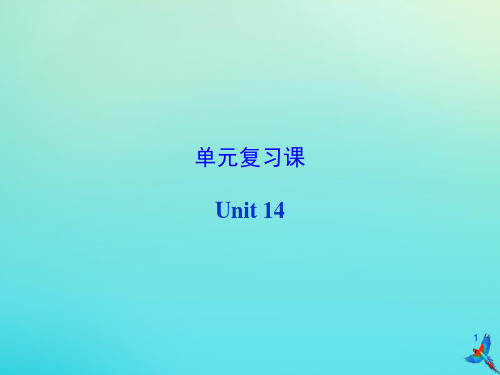
23. =
24.
with one’s help with the help of at the end of
sb
❖ 25. 设法去做
25. manage to do
❖ 26. 信任, 信赖
26. believe in
❖ 27. 首先
27. first of all
4
28.向某人祝贺某事 28. congratulate sb on sth
3
❖ 19. 付出更多的努力
19. put in more effort
❖ 20. 克服恐惧(心理)
20. overcome fear
❖ 21. 为……准备
21. prepare for
❖ 22. 盼望做
22. look forward to doing
❖ ❖
23. 24.
在某人的帮助下 在……末 ,在……尽头
❖ The many long hours of training
❖ Pride of overcoming fear
❖ excitement n. 兴奋 兴奋
excite v. 激动,
❖ excited adj. 兴奋的 exciting adj. 令人兴 奋的
❖ pride n. 自豪,骄傲 proud adj. 自豪, 骄傲
❖ 不同点:
❖ pride为名词,常用搭配为take pride in或be the pride of。
❖ proud为形容词,常用搭配为be proud of。
14
❖ 6.I remember starting day one ❖ The shyest in my whole class ❖ Never speaking to anyone ❖ And thinking I would not pass ❖ remember doing sth. ❖ 意为“记得做过某事”,表示动作已经发
高中英语 Unit14 名词性从句 语法考点超级归纳素材
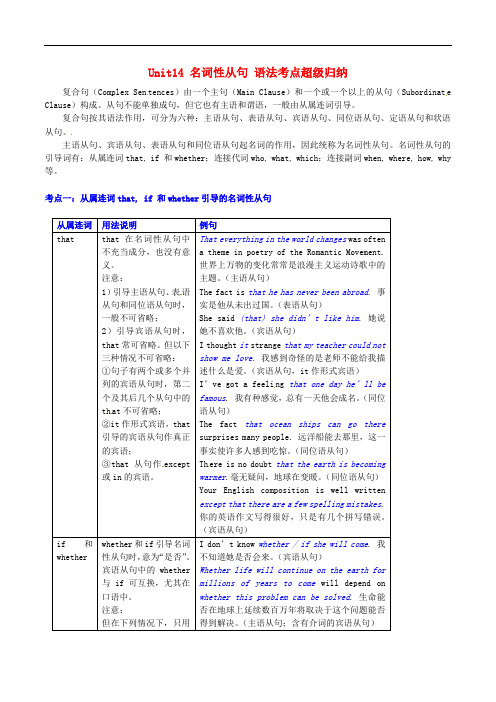
Unit14 名词性从句语法考点超级归纳复合句(Complex Sen tences)由一个主句(Main Clause)和一个或一个以上的从句(Subordinat e Clause)构成。
从句不能单独成句,但它也有主语和谓语,一般由从属连词引导。
复合句按其语法作用,可分为六种:主语从句、表语从句、宾语从句、同位语从句、定语从句和状语从句。
主语从句、宾语从句、表语从句和同位语从句起名词的作用,因此统称为名词性从句。
名词性从句的引导词有:从属连词that, if 和whether;连接代词who, what, which;连接副词when, where, how, why 等。
考点一:从属连词that, if 和whether引导的名词性从句从属连词用法说明例句that that在名词性从句中不充当成分,也没有意义。
注意:1)引导主语从句、表语从句和同位语从句时,一般不可省略;2)引导宾语从句时,that常可省略。
但以下三种情况不可省略:①句子有两个或多个并列的宾语从句时,第二个及其后几个从句中的th at不可省略;②it作形式宾语,that引导的宾语从句作真正的宾语;③that从句作except或in的宾语。
That everything in the world changes was often a theme in poetry of the Romantic Movement. 世界上万物的变化常常是浪漫主义运动诗歌中的主题。
(主语从句)The fact is that he has never been abroad. 事实是他从未出过国。
(表语从句)She said (that) she didn’t like him. 她说她不喜欢他。
(宾语从句)I thought it strange that my teacher could not show me love. 我感到奇怪的是老师不能给我描述什么是爱。
九年级英语unit14知识点总结

九年级英语unit14知识点总结Unit 14: Knowledge Review of Ninth Grade EnglishIntroduction:English language learning plays a crucial role in the academic development of students. In unit 14, we have covered various essential topics that have enhanced our command over the language. Let's delve deeper into the knowledge we have gained and how it can benefit us in our future studies and real-life situations.Vocabulary Expansion:One of the key aspects of language learning is expanding our vocabulary. In unit 14, we have encountered numerous new words and phrases, such as "environmental issues," "global warming," and "renewable energy." These terms enable us to discuss important topics related to the environment and understand their implications. A rich vocabulary aids in effective communication and allows us to express our thoughts accurately.Grammar Application:Unit 14 also focused on grammar, which helps us structure sentences properly. We reviewed the present perfect tense, which isused to describe actions that happened in the past but have a connection to the present. For example, "I have visited Beijing twice." This tense enables us to discuss our experiences and provide relevant information. Understanding and applying grammar rules allows us to convey our ideas clearly and concisely.Reading Comprehension:Improving our reading skills is essential to understanding written texts. Unit 14 included various reading passages that challenged us to comprehend and interpret information. We learned strategies such as skimming and scanning, which help us locate specific details quickly. Additionally, we practiced identifying the main idea of a text and making inferences based on the information provided. These skills are crucial not only for English language learning but also for success in other subjects that require extensive reading.Writing Skills:Unit 14 offered opportunities to enhance our writing skills through different writing tasks. We practiced writing informative essays on environmental issues and expressing our opinions on these matters. These exercises equipped us with the ability to articulate our thoughts and present arguments logically. Moreover, we learned how to use transitional words and phrases to create a coherent flow in our writing.Developing effective writing skills enables us to communicate our ideas persuasively and accurately.Listening and Speaking Proficiency:Unit 14 also emphasized improving our listening and speaking abilities. We engaged in various activities that required us to listen to spoken English and understand the context. We practiced listening for specific information and inferred meanings from conversations. Additionally, we participated in group discussions and debates, which encouraged us to express our opinions and engage in meaningful conversations. These exercises enhanced our listening and speaking skills, allowing us to effectively communicate in real-life situations.Conclusion:Unit 14 has provided us with an in-depth knowledge of various essential components of the English language. From vocabulary expansion to grammar application, reading comprehension to writing skills, and listening to speaking proficiency, we have developed a well-rounded understanding of English. These skills will not only benefit us in our future academic pursuits but also in our personal and professional lives. Through continuous practice and application of these learned skills, we can confidently communicate in English and navigate the globalized world.。
Lesson 14 Clause Translation

Lesson 14 Clause Translation(II)I. Attributive Clause Translation定语从句的翻译(一)前置法:把定语从句翻译到所修饰的先行词前面,用“……的”来连接。
1. Space and oceans are the new world which scientists are trying to explore.太空和海洋是科学家们努力探索的新领域。
2.His laughter, which was infectious, broke the silence.他那富有感染力的笑声打破了沉寂。
3. He who has never tasted what is bitter does not know what is sweet.没有吃过苦的人不知道什么是甜。
4. Those who sacrifice themselves for the people’s cause are the real heroes of history.为了人民事业牺牲自己的人是历史上真正的英雄。
5.Robots perform a variety of jobs that are often boring and sometimes dangerous.机器人能完成各种枯燥及有时非常危险的工作。
6.The course of a calculation in a computer is very much like a railroad for which the track is laid out in advance.计算机里的计算过程很象预先铺好轨道的铁路。
7.Our two countries are neighbors whose friendship is of long standing.我们两国是友谊长存的友好邻邦。
(二)、后置法:把定语从句翻译在所修饰的先行词后面,翻译为并列分句。
- 1、下载文档前请自行甄别文档内容的完整性,平台不提供额外的编辑、内容补充、找答案等附加服务。
- 2、"仅部分预览"的文档,不可在线预览部分如存在完整性等问题,可反馈申请退款(可完整预览的文档不适用该条件!)。
- 3、如文档侵犯您的权益,请联系客服反馈,我们会尽快为您处理(人工客服工作时间:9:00-18:30)。
问句或选择疑问转化而来的,因此也分别被称为 yes-no型疑问句从句和选择型疑问从句,其功能 和wh-从句的功能相同。例如:
• 2)选择性疑问从句 • 选择性疑问从句由关联词if/ whether…or或whether…or
not构成。例如:
– – – – Please tell me whether / if they are Swedish or Danish. 请告诉我他们是瑞典人还是丹麦人。 I don't care whether you like the plan or not. 我不在乎你是否喜欢该计划。
– It is common knowledge that… ……是常识 – It is a surprise that… 令人惊奇的是…… – It is a fact that… 事实是…… 似乎…… 碰巧…… 我突然想起……
14.1.3 名词性wh-从句
• 1)由wh-词引导的名词从句叫做名词性wh-从句。Wh-词包括
• 2)Wh-从句作主语也常用先行词it做形式主语,而将wh从句置于句末。例如:
– – – – It is not yet decided who will do that job. 还没决定谁做这项工作。 It remains unknown when they are going to get married. 他们何时结婚依然不明。
– 同位语:They are investigating the question whether the man is trustworthy. – 他们调查他是否值得信赖。 – 形容词宾语: She's doubtful whether we shall be able to come. – 她怀疑我们是否能够前来。 – 介词宾语: I worry about whether he can pass through the crisis of his illness. – 我担心他是否能度过疾病的危险期。
14.1.1 引导名词性从句的连接词
• 引导名词性从句的连接词可分为三类:
– 连接词: that, whether ,if (不充当从句的任 何成分) – 连接代词:what, whatever, who, whoever, whom, whose, which – 连接副词:when, where, how, why
Unit 14
Nominal, attributive and adverbial clauses
14. 1 名词性从句
• 在句子中起名词作用的句子叫名词从句。 • 名词从句的功能相当于名词词组, 它在复合
句中能担任主语、宾语、表语、同位语、 介词宾语等,因此根据它在句中不同的语 法功能,名词从句又可分别称为主语从句、 宾语从句、表语从句和同位语从句。
14.1.4 if, whether引导的名词从句
• 1)yes-no型疑问从句 • 从属连词if, whether引导的名词从句是由一般疑
– 主语:Whether the plan is feasible remains to be proved. – 这一计划是否可行还有等证实。 – 宾语:Let us know whether / if you can finish the article before Friday. – 请让我们知道你是否能在星期五以前把文章写完。 – 表语:The point is whether we should lend him the money. – 问题在于我们是否应该借钱给他。
用it作形式主语的that-从句有以下四 种不同的搭配关系:
• a. It + be +形容词+ that-从句
– It is necessary that… – It is important that… – It is obvious that…
• b. It + be + -ed 分词+ that-从句 • c. It + be +名词+ that-从句
– It is believed that… – It is known to all that… – It has been decided that…
有必要…… 重要的是…… 很明显……
人们相信…… 从所周知…… 已决定……
• d. It +不及物动词+ that-分句
– It appears that… – It happens that… – It occurred to me that…
14.1.2 名词性that-从句
• 1)由从属连词that引导的从句叫做名词性that-从句。
That只起连接主句和从句的作用,在从句中不担任任何成 分,本身也没有词义。名词性that-从句在句中能充当主语、 宾语、表语、同位语和形容词宾语。例如:
– – – – – – 主语:That he is still alive is sheer luck. 他还活着全靠运气。 宾语:John said that he was leaving for London on Wednesday. 约翰说他星期三要到伦敦去。 表语:The fact is that he has not been seen recently. 事实是近来谁也没有见过他。 同位语:The fact that he has not been seen recently disturbs everyone in his office. – 近来谁也没有见过他,这一情况令办公室所有的人不安。 – 形容词宾语:I am glad that you are satisfied with your job. – 你对工作满意我感到很高兴。
14.2.1 关系代词引导的定语从句
• 关系代词所代替的先行词是人或物的名词或代词,并在句中充当主语、宾语、
•
•
•
定语等成分。关系代词在定语从句中作主语时,从句谓语动词的人称和数要和 先行词保持一致。 1)who, whom, that 这些词代替的先行词是人的名词或代词,在从句中作主 语和宾语。例如: – Is he the man who/that wants to see you? – 他就是你想见的人吗?(who/that在从句中作主语) – He is the man whom/ that I saw yesterday. – 他就是我昨天见的那个人。(whom/that在从句中作宾语) 2) whose 用来指人或物,(只用作定语, 若指物,它还可以同of which互换)。 例如: – They rushed over to help the man whose car had broken down. – 那人车坏了,大家都跑过去帮忙。 – Please pass me the book whose (of which) cover is green. – 请递给我那本绿皮的书。 3)which, that所代替的先行词是事物的名词或代词,在从句中可作主语、宾 语等。例如: – A prosperity which / that had never been seen before appears in the countryside. – 农村出现了前所未有的繁荣。(which / that在句中作宾语) – The package (which / that)you are carrying is about to come unwrapped.
who, whom,. whose, whoever, what, whatever, which, whichever等连接代词和where, when, how, why等连接副词。 Wh-从句的语法功能除了和that-从句一样外,还可充当介词 宾语、宾语补语和间接宾语等。例如:
– – – – – – – – – – 主语:How the book will sell depends on its author. 书销售如何取决于作者本人。 直接宾语:In one‘s own home one can do what one likes. 在自己家里可以随心所欲。 间接宾语:The club will give whoever wins a prize. 获胜者俱乐部将颁奖。 表语:My question is who will take over president of the Foundation. 我的问题是谁将接任该基金会主席职位。 宾语补足语:She will name him whatever she wants to. 她高兴给他起什么名字就取什么名字。
• 4)有时状语或状语从句中否定可以转移到谓语动词前。例如:
14.2 定语从句
Байду номын сангаас• 定语从句在句中做定语,修饰一个名词或
代词,被修饰的名词词组或代词即先行词。 定语从句通常出现在先行词之后,由关系 词(关系代词或关系副词)引出。
– 关系代词有:who, whom, whose, that, which 等。 – 关系副词有:when, where, why等。
• 2)That-从句作主语通常用it作先行词,而
将that-从句置于句末。例如: • It is quite clear that the whole project is doomed to failure. • 很清楚,整个计划注定要失败。 • It‘s a pity that you should have to leave. • 你非走不可真是件憾事。
– I hope you weren't ill. 我想你没有生病吧。
• 3)有时将动名词,介词短语或整个从句的否定转变为对谓语动词的否定。
例如:
– I don‘t remember having ever seen such a man. – 我记得从未见过这样一个人。(not否定动名词短语 having…) – It's not a place where anyone would expect to see strange characters on the street. – 在这里,人们不会想到在街上会碰上陌生的人。(anyone 作主语,从句中的 谓语动词不能用否定形式。) – – – – – The ant is not gathering this for itself alone. (否定状语) 蚂蚁不只是为自己采食。 He was not ready to believe something just because Aristotle said so. (否定because状语) 他并不因亚里斯多德说过如何如何,就轻信此事。 She had not been married many weeks when that man's younger brother saw her and was struck by her beauty. – (否定状语many weeks) 她结婚还不到几个月,这个人的弟弟就看见她了, 并对她的美貌着了迷。
